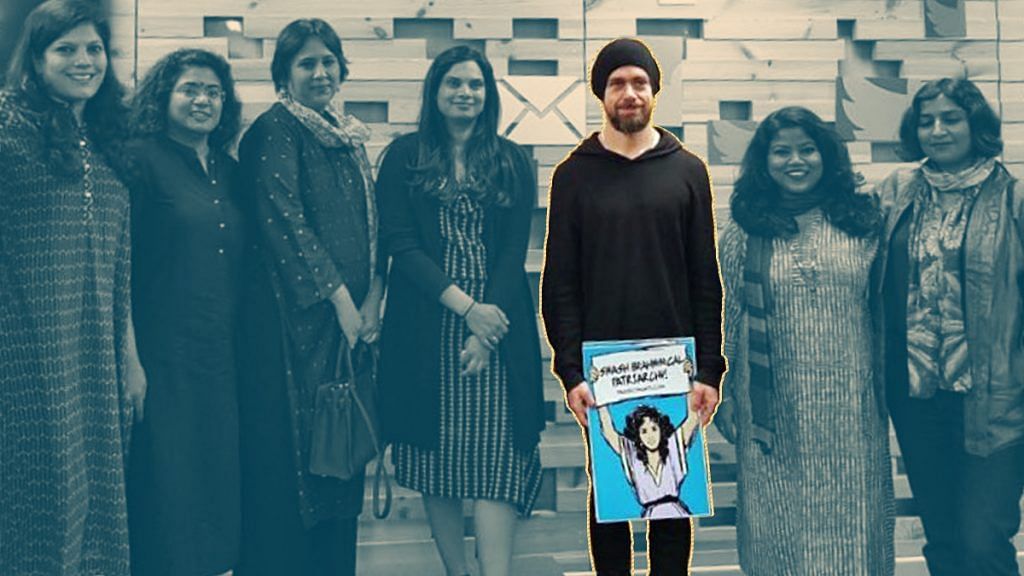New Delhi: Jack Dorsey, the CEO of the microblogging site Twitter, courted some serious controversy not so long ago by carrying a placard that read “smash Brahminical patriarchy”, but if he does appear before the parliamentary panel that has summoned him on 25 February, he will be face-to-face with at least five Brahmins.
The parliamentary committee on information technology, which has summoned Twitter representatives over the issue of ‘safeguarding citizens’ rights on social media platforms’, was spurred into action after a volunteer group wrote to it about what it perceives as the platform’s bias against Right-wing and pro-Bharatiya Janata Party (BJP) handles.
The Brahmin members of the 31-member panel include Trinamool Congress’ Prasun Banerjee, Shiv Sena’s Hemant Tukaram Godse, and BJP’s Hema Malini, Paresh Rawal and Vinay Sahasrabuddhe.
While Malini is a veteran actor, Rawal — also an actor — is extremely active on Twitter and uses it to further his politics and the party’s agenda. Also on the panel is media baron Subhash Chandra, the chairman of Essel Group.
Other members include veteran BJP leader L.K. Advani, Congress leader Raj Babbar, CPI(M)’s P. Karunakaran, and Samajwadi Party’s Beni Prasad Verma ().
In November last year, Dorsey had landed himself in a spot during his visit to India when, at a meeting with women journalists and activists, he posed for a group photo holding a “smash Brahminical patriarchy” placard.
Much outrage and backlash followed, compelling Twitter to issue a statement clarifying its position and expressing regret.
The second attempt
The 25 February summons is the second attempt by the parliamentary committee on information technology to get Dorsey to appear before it, after US-based Twitter said the earlier date, 11 February, was too short a notice for its senior officials to travel to India.
With Twitter not sending its top representatives Monday, BJP MP Anurag Thakur — who heads the committee — said the panel “takes very serious note of this” and “will take appropriate action on 11 February”, even as his party colleagues chimed in to say Twitter would have to face “repercussions”.
However, even as Thakur and others in the BJP flex their muscles, the committee’s powers are eventually limited, given that its report merely has “persuasive value”. The situation is made more complex by the fact that general elections are barely months away and the 16th Lok Sabha will be dissolved soon.
Also read: Why India’s Parliament should avoid standoffs with Twitter on unimportant issues
The panel’s powers
The rules of the Lok Sabha very lucidly lay down the powers and role of department-wise parliamentary committees, including the conditions under which they can summon or invite people to appear before them.
According to the rules, “a witness may be summoned by an order signed by the secretary-general and shall produce such documents as are required for the use of a Committee”.
The rules also say the panel will have the power “to send for persons, papers and records”, and “if any question arises whether the evidence of a person or the production of a document is relevant for the purposes of the committee”, the decision of the Speaker will be final.
While the aforementioned rule refers to summoning a witness or a person whose evidence may be relevant, the panel can also “avail of… expert opinion or… public opinion to make the report.”
It remains unclear under which of the two categories Twitter representatives have been called by the panel, though the first option is largely meant for government representatives.
Most importantly, the reports of these committees — to be based on “consensus” — are not binding and are more advisory in nature. “The report of the Standing Committees shall have persuasive value and shall be treated as considered advice given by the Committees,” the rules state.
Thus, even if the panel recommends a harsh measure against Twitter, the government need not accept it. Incidentally, Prime Minister Narendra Modi, his entire cabinet and other senior BJP leaders are all ardent users of the microblogging site.
Also read: Twitter CEO or top officials, no one else will do: Parliamentary panel issues summons again
